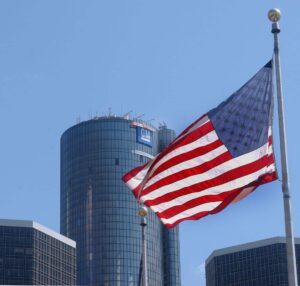
Australia’s Formula One race this weekend was scrubbed, along with a number of other motorsports events.
With the coronavirus outbreak now declared pandemic, the impact on daily life is expected to become increasingly significant — and the auto industry is already feeling the brunt of the outbreak as plants close, workers get quarantined, sales tumble, events are cancelled and profits rapidly dry up.
It’s difficult to find a single aspect of life within the auto industry that isn’t feeling the impact as the breadth and depth of the deadly disease becomes ever more apparent.
Within just the last 24 hours, General Motors has announced that non-manufacturing workers will be told to start working from home as of Monday, March 16. Daimler AG has cancelled its annual shareholders’ meeting. A host of motorsports events, including the Formula One race in Australia, have been cancelled or postponed.
(More on GM’s decision to send workers home.)
With Wall Street and other stock markets around the world in freefall, and growing fears about the impact on consumers, the coronavirus pandemic is threatening to suck the financial life out of an auto industry already bracing for shrinking sales before the word, “coronavirus” became part of the global vocabulary.
The biggest question is how long will the pandemic last? In widely panned comments, President Donald Trump recently suggested that it was already going away. As the number of reported cases explodes in the U.S. and many other parts of the world that idea has been dashed. There are positive signs from a few places, notably South Korea and even China, the epicenter of the outbreak. But few experts think the situation can be brought under control in less than three months.
Adam Rosh, a specialist in emergency medicine and the impact of epidemics, told TheDetroitBureau.com that it likely will take far longer, noting the deadly Spanish Flu that killed an estimated 50 million worldwide a century ago “lasted two years.”
In the short-term, automakers are taking aggressive moves to cancel events, restrict travel and, where necessary, close plants. Among the latest developments:
· GM told TheDetroitBureau.com on Friday it “is taking steps to minimize the exposure to team members and our business” and asking much of its staff and contractors to start working at home as of March 16 – though “we don’t have that option in manufacturing”;
· An assortment of motor sports events scheduled for this weekend are scrubbed, including the Formula One race in Australia and the Acura Grand Prix in Long Beach, CA;
· Fiat Chrysler is closing plants temporarily in Pomigliano d’Arco, Melfi, Atessa and Cassino, Italy. It will keep open its Kokomo Transmission Plant, however, even after learning a salaried worker has Covid-19. That employee is getting medical care and some others are quarantined;
· Daimler AG said Friday it will postpone the shareholder’s meeting originally scheduled for the first of April.
(FCA shuts plants in Italy as virus spreads.)
The news isn’t entirely negative. Toyota now plans to reopen one of its major assembly plants, in Guangzhou, on Monday, following a month-long closure.
Chinese government officials have signaled that new cases of the disease may be declining. Automakers there initially closed scores of plants in late January and early February, but have begun reopening many of them. That said, Michael Dunne, founder of the Asian automotive consulting firm ZoZoGo, remains skeptical, telling TheDetroitBureau.com that attendance at many Chinese factories remains as low as 20 to 30%, permitting only low levels of production, in many cases.
Parts shortages already have impacted some operations outside China, notably Hyundai’s Korean factories, the automaker heavily dependent upon Chinese suppliers. That situation is expected to get worse, and go global, according to an advisory issued Friday by J.D. Power and Associates.
“There’s no telling how widespread or long lasting the ripple effect of the coronavirus will be for the automotive industry,” said Chris Sutton, a vice president with J.D. Power.
(U.S. auto sales may fall off due to coronavirus.)
The impact, Power warned in a statement, will be felt in a variety of ways. These can include factories, as well as retail outlets and service and repair facilities.
Some shops already are running into shortages of replacement body parts and other Chinese-made good. That “could dramatically increase due to parts suppliers’ extended shutdowns in China and other locations, Sutton warned.
In China, the world’s largest automotive market, industry trade officials reported that new vehicle sales plunged nearly 90% in February. In the U.S., demand was relatively unaffected last month, but that may change fast as increasing concerns about the pandemic – and recommendations that Americans practice “social distancing” – play out at showrooms.
Last week, Stephanie Brinley, principal automotive analyst with IHS Markit, told NBCNews the research firm had cut its U.S. sales forecast for the year to 16.6 million from last year’s 17.1 million – with a “worst case” figure as low as 16 million. This week, Adam Jonas, the widely followed auto analyst with Morgan Stanley, warned that “demand shock” caused by the pandemic could push sales down as low as 15.5 million. Before the crisis began to unfold, Jonas had foreseen only a modest 1 to 2% decline for 2020.
It likely won’t help that a number of auto shows – which historically help build excitement among potential buyers – are being cancelled or delayed. This month’s Geneva International Motor Show was scrubbed for the first time in its 90-year history. The Beijing Motor Show is being indefinitely postponed and the New York International Auto Show will be pushed back from April to August. It remains uncertain whether the North American International Auto Show will go ahead as planned. This year it was set to move from its normal January date to June.
(New York Auto Show forced to reschedule for first time since World War II.)
Automakers also are scrubbing a series of product debuts scheduled for March and April, including the public unveilings of the new Cadillac Lyriq, the brand’s first all-electric vehicle, planned for April 2. Some, however, are finding alternative ways to get the news out. BMW, Mercedes-Benz and Volkswagen used webcasts to preview the new models they were to have unveiled in Geneva this month and, next Tuesday, Hyundai will use the same, high-tech approach to unveil its next-generation Elantra sedan, having cancelled the media debut scheduled to take place in Los Angeles that day.
Just how bad the industry will be hit by this could start to become apparent in April when manufacturers begin releasing first-quarter earnings reports. The impact will vary by company, depending upon how broad the impact of the pandemic spreads and how long it continues. Those likely to be hardest hit, however, will be companies with a sizable presence in China, such as General Motors, Volkswagen and Nissan.
The Japanese automaker has four large factories in Japan. Three of those, as well as its Chinese headquarters, are based in Hubei, the epicenter of the coronavirus outbreak. Citigroup this week warned that Nissan could see its net profit for the 2020-2021 fiscal year fall by as much as 35%.




